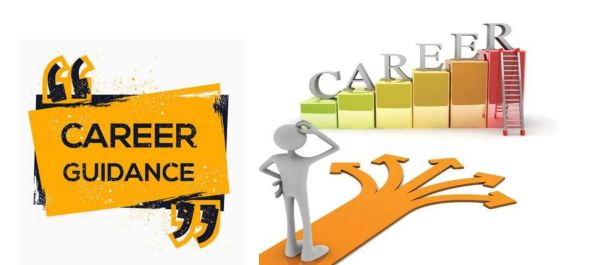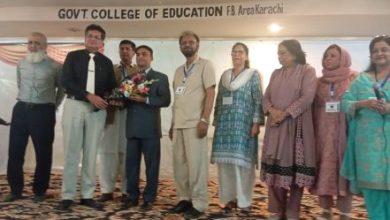Bridging the Career Guidance Gap

In most Asian countries, career guidance is either absent or severely underdeveloped in schools.
- Without informed guidance, too many young people in Asia are drifting into unsuitable fields, leading to burnout, frustration, and wasted potential.
Ali Nawaz Rahimoo
A few days ago, my friend invited me to counsel his son, hoping to help him chart his future. I turned to the boy and asked a simple question: What do you want to do with your life? What excites you, what drains you, what truly matters to you? Before he could speak, his mother jumped in: “We just want a good education.” Curious, I asked her to clarify. “One that gives him a good job,” she said firmly. I chose not to challenge her definition not the time to debate personal growth, creativity, or social contribution. For now, a job it would be. She then suggested that he pursue something in computers. I looked at the boy. He shrugged, echoing the familiar refrain of many teenagers: “Computer science has the jobs of the future.” Yet it was obvious he had little idea what computer science actually involved, or what kinds of roles it could lead to. Technology didn’t excite him; his interests leaned more toward business studies and marketing. Still, he sat there, guided more by parental pressure, social expectations, and the hype of the job market than by his own curiosity. It was a scene I’ve witnessed before: a young person at a crossroads, carrying someone else’s ambitions, while his own quietly waited for permission to emerge.
This single case reflects a much broader issue across South and East Asia: the lack of structured academic and career counselling for students at the secondary and higher-secondary levels.
The Missing Counsellors
In most Asian countries, career guidance is either absent or severely underdeveloped in schools. According to UNESCO (2023), fewer than 15% of public schools in South Asia have trained career counsellors. In Pakistan, the ratio is estimated at 1 counsellor for every 8,000 students. India fares only slightly better, with roughly 1 counsellor per 3,000 students, while Singapore, Japan, and South Korea maintain ratios below 1:300 illustrating the regional gap. Private counselling firms do exist in metropolitan areas such as Karachi, Delhi, Manila, or Jakarta, but their services are expensive and urban-centric. For the majority of students in rural or semi-urban schools, career decisions are made in an information vacuum, guided more by family opinion than by data or aptitude.
The “Computer Science Syndrome”
Across Asia, there has been a dramatic surge in demand for computer science and IT-related degrees. Between 2015 and 2024, enrolment in computing disciplines rose by over 70% in India, 60% in Bangladesh, and 45% in Pakistan, according to national higher education commissions. This demand has reshaped university structures: traditional subjects like physics, literature, and social sciences have seen enrolments drop by 30–50% in some institutions.
Universities are responding reactively. Departments are being renamed or rebranded to attract students “Physics and Robotics”, “Business Analytics”, “Digital Humanities” — even when faculty or curricula are only superficially adapted. The long-term impact on academic quality, research diversity, and graduate readiness is rarely discussed. Yet, not all students who choose computer science succeed or even enjoy it. A 2022 survey by the Asian Development Bank (ADB) found that 40% of STEM graduates in South Asia are underemployed or working outside their field. Meanwhile, sectors like renewable energy, sustainable agriculture, health sciences, logistics, and digital marketing are growing rapidly — but attract fewer applicants due to lack of awareness.
Career Choice in the Age of Change
Today’s economies are fluid. The average worker in Asia changes jobs every 4–5 years, compared to once every 10–12 years two decades ago. Manufacturing has plateaued, and the services sector now accounts for 55–70% of GDP in countries like India, Sri Lanka, and the Philippines. Jobs are increasingly short-term, skill-based, and interdisciplinary. Given these realities, young people need broad-based education and informed flexibility not narrow specialization chosen in haste. A Bachelor’s degree can still be valuable, but its field should align with genuine interest and emerging trends, not temporary demand.
The Urgent Need for Counselling Reform
Without structured counselling systems, students and parents rely on social myths, market hearsay, and peer choices. This leads to information asymmetry one of the most damaging but invisible barriers to sustainable education planning. Countries like Singapore, Japan, and Malaysia have already integrated career guidance frameworks within their national education policies. In Singapore, every secondary school student must undergo at least 20 hours of career orientation before graduation. In contrast, South Asian education systems lag behind, where guidance is often limited to a one-time university fair or generic online form. If universities and regulators in countries like Pakistan, India, Bangladesh, and Nepal want to produce employable, motivated graduates, they must invest in structured counselling ecosystems staffed by trained professionals, not volunteers or marketing agents. This means:
- Establishing career guidance offices in every secondary and tertiary institution.
- Linking counselling with labor market data and future skills forecasts.
- Providing training and certification for counsellors.
- Encouraging private–public partnerships to make services accessible in rural areas.
Life is long, and careers are evolving faster than ever. A person may spend 40 to 50 years working so their field of study should align with what truly excites and fulfills them. Without informed guidance, too many young people in Asia are drifting into unsuitable fields, leading to burnout, frustration, and wasted potential. Education should help students find meaning, not just employment. For that, we must first help them find themselves and that begins with counselling.
Read: Education in Pakistan: Inequality Rebranded
____________________
 Ali Nawaz Rahimoo, based in Umerkot, Sindh is a social development professional. He can be contacted on anrahimoo@gmail.com
Ali Nawaz Rahimoo, based in Umerkot, Sindh is a social development professional. He can be contacted on anrahimoo@gmail.com




